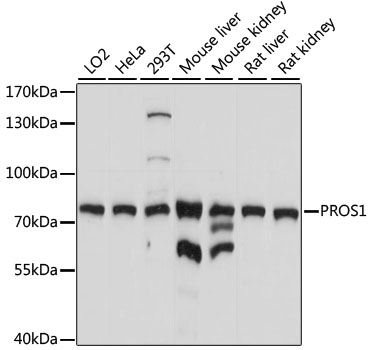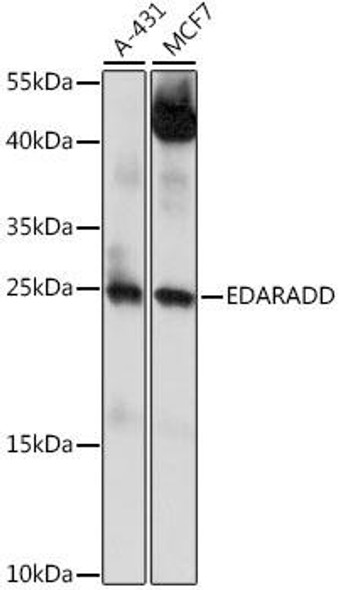Cardiovascular Antibodies
Anti-PROS1 Antibody (CAB1595)
- SKU:
- CAB1595
- Product Type:
- Antibody
- Reactivity:
- Human
- Reactivity:
- Mouse
- Reactivity:
- Rat
- Host Species:
- Rabbit
- Isotype:
- IgG
- Antibody Type:
- Polyclonal Antibody
- Research Area:
- Cardiovascular
Description
| Antibody Name: | Anti-PROS1 Antibody |
| Antibody SKU: | CAB1595 |
| Antibody Size: | 20uL, 50uL, 100uL |
| Application: | WB |
| Reactivity: | Human, Mouse, Rat |
| Host Species: | Rabbit |
| Immunogen: | Recombinant fusion protein containing a sequence corresponding to amino acids 405-676 of human PROS1 (NP_000304.2). |
| Application: | WB |
| Recommended Dilution: | WB 1:500 - 1:2000 |
| Reactivity: | Human, Mouse, Rat |
| Positive Samples: | LO2, HeLa, 293T, Mouse liver, Mouse kidney, Rat liver, Rat kidney |
| Immunogen: | Recombinant fusion protein containing a sequence corresponding to amino acids 405-676 of human PROS1 (NP_000304.2). |
| Purification Method: | Affinity purification |
| Storage Buffer: | Store at -20'C. Avoid freeze / thaw cycles. Buffer: PBS with 0.02% sodium azide, 50% glycerol, pH7.3. |
| Isotype: | IgG |
| Sequence: | MDIN KPGP LFKP ENGL LETK VYFA GFPR KVES ELIK PINP RLDG CIRS WNLM KQGA SGIK EIIQ EKQN KHCL VTVE KGSY YPGS GIAQ FHID YNNV SSAE GWHV NVTL NIRP STGT GVML ALVS GNNT VPFA VSLV DSTS EKSQ DILL SVEN TVIY RIQA LSLC SDQQ SHLE FRVN RNNL ELST PLKI ETIS HEDL QRQL AVLD KAMK AKVA TYLG GLPD VPFS ATPV NAFY NGCM EVNI NGVQ LDLD EAIS KHND IRAH SCPS VWKK TKNS |
| Gene ID: | 5627 |
| Uniprot: | P07225 |
| Cellular Location: | Secreted |
| Calculated MW: | 75kDa |
| Observed MW: | 75kDa |
| Synonyms: | PROS1, PROS, PS21, PS22, PS23, PS24, PS25, PSA, THPH5, THPH6 |
| Background: | This gene encodes a vitamin K-dependent plasma protein that functions as a cofactor for the anticoagulant protease, activated protein C (APC) to inhibit blood coagulation. It is found in plasma in both a free, functionally active form and also in an inactive form complexed with C4b-binding protein. Mutations in this gene result in autosomal dominant hereditary thrombophilia. An inactive pseudogene of this locus is located at an adjacent region on chromosome 3. Alternative splicing results in multiple transcript variants encoding different isoforms that may undergo similar processing to generate mature protein. |
| UniProt Protein Function: | PROS1: Anticoagulant plasma protein; it is a cofactor to activated protein C in the degradation of coagulation factors Va and VIIIa. It helps to prevent coagulation and stimulating fibrinolysis. Defects in PROS1 are the cause of thrombophilia due to protein S deficiency, autosomal dominant (THPH5). A hemostatic disorder characterized by impaired regulation of blood coagulation and a tendency to recurrent venous thrombosis. However, many adults with heterozygous disease may be asymptomatic. Based on the plasma levels of total and free PROS1 antigen as well as the serine protease-activated protein C cofactor activity, three types of PROS1D have been described: type I, characterized by reduced total and free PROS1 antigen levels together with reduced anticoagulant activity; type III, in which only free PROS1 antigen and PROS1 activity levels are reduced; and the rare type II which is characterized by normal concentrations of both total and free PROS1 antigen, but low cofactor activity. Defects in PROS1 are the cause of thrombophilia due to protein S deficiency, autosomal recessive (THPH6). A very rare and severe hematologic disorder resulting in thrombosis and secondary hemorrhage usually beginning in early infancy. Some affected individuals develop neonatal purpura fulminans, multifocal thrombosis, or intracranial hemorrhage. |
| UniProt Protein Details: | Protein type:Secreted; Secreted, signal peptide Chromosomal Location of Human Ortholog: 3q11.2 Cellular Component: Golgi membrane; extracellular space; endoplasmic reticulum membrane; Golgi lumen; plasma membrane; extracellular region Molecular Function:endopeptidase inhibitor activity; calcium ion binding Biological Process: platelet activation; fibrinolysis; platelet degranulation; cellular protein metabolic process; regulation of complement activation; innate immune response; proteolysis; blood coagulation; post-translational protein modification; leukocyte migration; peptidyl-glutamic acid carboxylation Disease: Thrombophilia Due To Protein S Deficiency, Autosomal Recessive; Thrombophilia Due To Protein S Deficiency, Autosomal Dominant |
| NCBI Summary: | This gene encodes a vitamin K-dependent plasma protein that functions as a cofactor for the anticoagulant protease, activated protein C (APC) to inhibit blood coagulation. It is found in plasma in both a free, functionally active form and also in an inactive form complexed with C4b-binding protein. Mutations in this gene result in autosomal dominant hereditary thrombophilia. An inactive pseudogene of this locus is located at an adjacent region on chromosome 3. [provided by RefSeq, Feb 2009] |
| UniProt Code: | P07225 |
| NCBI GenInfo Identifier: | 131086 |
| NCBI Gene ID: | 5627 |
| NCBI Accession: | P07225.1 |
| UniProt Secondary Accession: | P07225,Q08761, P53813, |
| UniProt Related Accession: | P07225 |
| Molecular Weight: | 676 |
| NCBI Full Name: | Vitamin K-dependent protein S |
| NCBI Synonym Full Names: | protein S (alpha) |
| NCBI Official Symbol: | PROS1 |
| NCBI Official Synonym Symbols: | PSA; PROS; PS21; PS22; PS23; PS24; PS25; THPH5; THPH6 |
| NCBI Protein Information: | vitamin K-dependent protein S; protein Sa; vitamin K-dependent plasma protein S |
| UniProt Protein Name: | Vitamin K-dependent protein S |
| Protein Family: | Protein |
| UniProt Gene Name: | PROS1 |
| UniProt Entry Name: | PROS_HUMAN |
View AllClose







